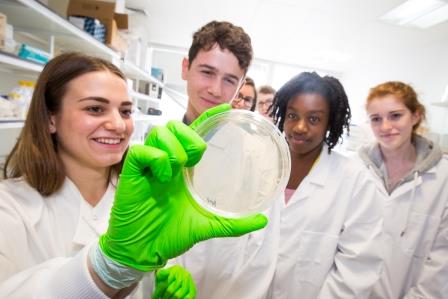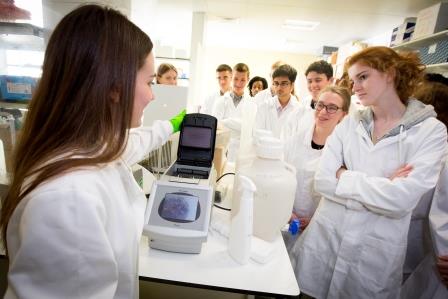A group of London students have been invited to take part in research aimed at developing new ways to treat cancer.
The students, who are from Graveney School in Wandsworth, visited the Royal Free Hospital on Wednesday in order to learn more about the cancer research being carried out at the UCL Institute of Immunity and Transplantation (IIT).
Researchers at the IIT are developing new ways of treating cancer with gene therapy. The treatment involves modifying the body’s own immune cells so they are better at spotting and killing cancer.
The students have been asked to create vectors, which are loops of DNA. They contain genes which code for receptors on an immune cell, which recognise the cancer and enable the immune cell to kill it.
The vectors would be inserted into a patient’s immune cell so that it would produce the receptor.
The 20 students, who are all in year 12 at Graveney School, will be working in groups to isolate different versions of the DNA vector. They will then return to the Royal Free Hospital where the vectors will be tested on immune cells to establish how effective they are.
They were shown around the labs at the Royal Free Hospital on Wednesday by director of the IIT, Professor Hans Stauss.
Students were asked to apply to take part in the project by explaining in a written answer how the body’s immune system can fight cancer.
Rhian Fisher, a biology teacher at Graveney, said: “This is a wonderful opportunity for our students to take part in some ground-breaking research that is hopefully going to improve the prognosis for millions of cancer patients.
“The interest from our students has been astonishing. We initially proposed that 10 students would take part but there were so many high-quality submissions that in the end we chose 20. They will now work in smaller groups to create the vectors at school. They will then bring them back to the Royal Free so they can be inserted into an immune cell.”
 Graveney School and the National Institute for Health Research University College London Hospitals Biomedical Research Centre (BRC) both helped finance new equipment that will enable the vectors to be created in the school labs, include a polymerase chain reaction machine and a centrifuge.
Graveney School and the National Institute for Health Research University College London Hospitals Biomedical Research Centre (BRC) both helped finance new equipment that will enable the vectors to be created in the school labs, include a polymerase chain reaction machine and a centrifuge.
Two of the students taking part said it was an exciting project to be involved in.
Ruby Robinson, 17, said: “It was quite an interesting idea - that I could be part of the team researching a new treatment for cancer. Taking part in this means we will be using new scientific equipment and picking up new skills. So I am really looking forward to it.”
Tilly Roberts, also 17, added: “I wanted to understand the work they are doing a bit more. When you see these developments on the news you don’t always get the full picture. It’s great to see what is going on. It’s amazing to think they are close to a breakthrough in treating cancer.”
Professor Stauss said: “We are thrilled to be working with Graveney students on this project. They seemed incredibly interested in this research and it will be fascinating to see how they get on. This project will enable them to gain first-hand experience of medical research and we hope they will be inspired by the work we are doing here at the IIT.”
Professor Emma Morris, the BRC’s infection, immunity and inflammation programme director and a Royal Free consultant, said: “This is a great opportunity to bring research alive in schools and excite young people about the opportunities to impact society through medical and life science research.”
Ends
Images: Scientist Alice Piapi gives a demonstration to the students
Notes to editors
Media contacts: rf.mediaenquiries@nhs.net or call 020 7472 6665
About the Royal Free London NHS Foundation Trust
The Royal Free began as a pioneering organisation and continues to play a leading role in the care of patients. Our mission is to provide world class expertise and local care. In the 21st century, the Royal Free London continues to lead improvements in healthcare.
The Royal Free London attracts patients from across the country and beyond to its specialist services in liver and kidney transplantation, haemophilia, renal care, HIV, infectious diseases, plastic surgery, immunology, Parkinson's disease, vascular surgery, cardiology, amyloidosis and scleroderma and we are a member of the academic health science partnership UCLPartners.
In July 2014 Barnet Hospital and Chase Farm Hospital became part of the Royal Free London. Read 'A bigger trust, a better future'.
 Translate
Translate
